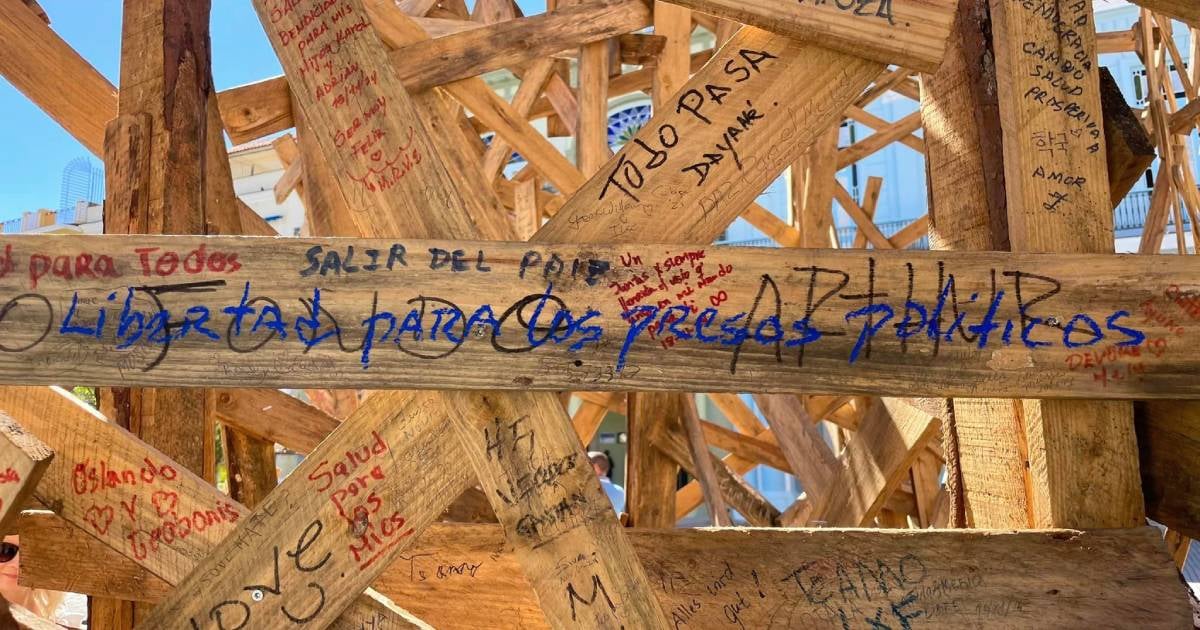
Cuban graffiti artist Yulier Rodríguez took advantage of the 15th Havana Biennial to call for the freedom of political prisoners on the island.
While commenting on the work "Nube de madera - La arquitectura de los deseos" by the German sculptor Martin Steinert, the young graffiti artist inscribed four messages in blue across different sections of the wooden slats.
The Steinert piece, displayed in the iconic Plaza Vieja of the capital, is a monumental installation that invites reflection on human aspirations and encourages Cubans to express their wishes on its wooden boards.
These served as a canvas for Rodríguez to write "Freedom for political prisoners," "freedom for José Daniel Ferrer," "freedom for Luis Manuel Otero Alcántara," and "freedom for Maykel Osorbo."
The gesture of Yulier Rodríguez, known for his expressive graffiti that critiques urban decay and power mechanisms, highlights the symbolic value of art as a vehicle for protest, placing the issue of human rights in a space intended for artistic reflection but controlled by the regime.
Wood Cloud had previously been described by Steinert as an invitation to curiosity and dialogue. Rodríguez, in his social media post, referred to his action as "my contribution to the Biennial."
Rodríguez's intervention and denunciation adds to the voices, both inside and outside of Cuba, calling for the release of imprisoned opposition figures and activists, as well as those arrested during the July 11, 2021, protests who are serving unjust sentences in the island's prisons.
The cultural authorities of the Biennial and the German artist himself have not issued any statements regarding the incident.
In other parts of the work, the dreams of Cubans can be read: "Health and Freedom," "To put an end to the greatest farce in history," "To leave the country," "To travel," "Freedom," "Freedom," "Freedom."
Frequently Asked Questions about Artistic Intervention at the Havana Biennial
Who is Yulier Rodríguez and what did he do at the Havana Biennial?
Yulier Rodríguez is a Cuban artist known for his critical graffiti that addresses urban decay and the mechanisms of power in Cuba. At the 15th Havana Biennial, he intervened in the piece "Wooden Cloud" by German sculptor Martin Steinert, writing messages calling for the freedom of various political prisoners on the island.
What messages did Yulier Rodríguez write in the work "Nube de madera"?
Yulier Rodríguez wrote messages such as "Freedom for political prisoners," "freedom for José Daniel Ferrer," "freedom for Luis Manuel Otero Alcántara," and "freedom for Maykel Osorbo" on the wooden boards of the piece "Nube de madera."
What was the reaction of the cultural authorities of the Biennial to Rodríguez's intervention?
So far, the cultural authorities of the Havana Biennial and the German sculptor Martin Steinert have not made any public statements regarding Yulier Rodríguez's intervention in his work.
What is the meaning of the work "Nube de madera" and how does it relate to Rodríguez's intervention?
"Wooden Cloud," created by Martin Steinert, is an installation that invites reflection on human desires. Rodríguez's intervention, by writing messages about political prisoners, uses the work as a platform to highlight the struggle for human rights and freedom in Cuba, aligning with the original purpose of sparking dialogue and curiosity.
Filed under: